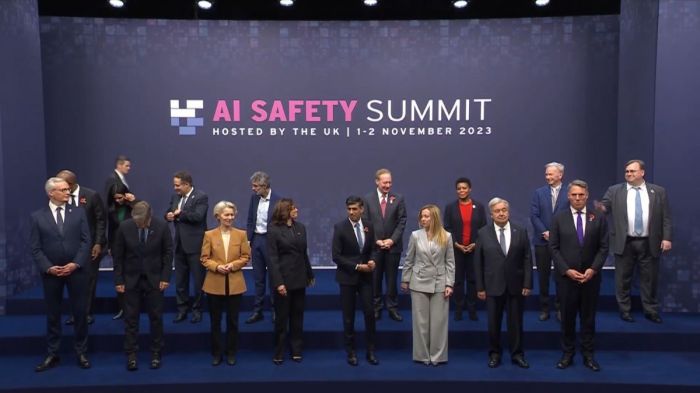
Paris AI summit must set global standards. The world is rapidly embracing artificial intelligence, but its potential benefits are shadowed by ethical concerns and the need for responsible development. From data privacy to algorithmic transparency, the Paris AI summit must establish clear global standards to ensure AI is used safely and equitably. This crucial summit is not just about regulating AI; it’s about fostering trust, encouraging collaboration, and shaping a future where AI benefits all of humanity.
The summit’s success hinges on navigating complex political landscapes and addressing the diverse needs of various stakeholders, including governments, industry, researchers, and civil society.
The summit’s agenda should cover a wide range of AI applications, analyzing the specific challenges each presents. A comprehensive framework should be developed, incorporating lessons from existing regulatory frameworks around the world. This comparative analysis is essential for identifying best practices and potential pitfalls. By focusing on concrete examples of existing AI standards and potential future challenges, the summit can pave the way for a truly global approach to AI governance.
Defining Global Standards for AI
Global standards for Artificial Intelligence (AI) are crucial for ensuring responsible development and deployment of this transformative technology. Without a globally recognized framework, the potential benefits of AI are at risk of being overshadowed by ethical concerns, security risks, and societal disruptions. This necessitates a collaborative effort among nations, industries, and researchers to establish clear guidelines and regulations that foster trust and mitigate potential harms.Establishing these standards requires a multifaceted approach, addressing not only the technical aspects of AI but also its societal implications.
This involves a deep understanding of the various applications of AI, the challenges they present, and the potential benefits of standardized approaches. The development of common principles and best practices will ensure that AI advancements benefit all of humanity, rather than exacerbating existing inequalities.
Defining Global Standards in AI
Global standards in AI encompass a set of principles, guidelines, and regulations that govern the development, deployment, and use of AI systems across different countries and cultures. These standards should address data privacy, algorithmic transparency, safety protocols, and accountability for AI systems. They are designed to promote responsible innovation and mitigate potential risks associated with the technology. They should be adaptable and responsive to evolving technological advancements, ensuring ongoing relevance and efficacy.
Aspects of AI Requiring Standardization
Several key aspects of AI necessitate standardization to ensure responsible and equitable application across the globe. These include data privacy regulations, guaranteeing the ethical and secure handling of personal data used in training AI models. Algorithmic transparency standards are essential for understanding how AI systems make decisions, fostering trust and allowing for human oversight. Safety protocols are critical to prevent unintended consequences and ensure the reliability and safety of AI systems, particularly in high-risk applications like autonomous vehicles or medical diagnoses.
The Paris AI summit absolutely must establish global standards for AI development. A critical example of how poorly handled international relations can derail progress is evident in how Trump squandered a diplomatic opening in Ukraine, how trump squandered a diplomatic opening in ukraine. Ignoring such missteps is crucial; the potential for AI misuse is immense, and a collaborative, globally-agreed framework is essential to prevent future disasters, highlighting the urgent need for the Paris summit to set the stage for responsible AI development.
Potential Benefits of Global AI Standards
Global AI standards offer numerous benefits, including fostering trust in AI systems, promoting responsible innovation, and mitigating potential risks. Harmonized standards will lead to more efficient development and deployment of AI systems, as developers will not have to comply with numerous and potentially conflicting regulations. Standardized procedures for evaluating and testing AI systems will ensure consistent quality and reliability.
This will facilitate international collaboration and the exchange of knowledge and best practices.
Categorizing AI Applications for Standardization
AI applications are diverse, ranging from image recognition to autonomous vehicles. The unique characteristics of each application present different challenges for standardization. A robust framework must consider the specific context and potential risks associated with each category.
- Autonomous Systems (e.g., self-driving cars): Safety protocols and testing procedures must be standardized to ensure the reliability and safety of these systems. This includes clear definitions of liability and responsibility in case of accidents.
- Healthcare (e.g., diagnostics, drug discovery): Data privacy and security protocols are paramount in healthcare applications. Standardization will ensure patient data is protected and used responsibly, while also maintaining the efficacy of AI-driven diagnostics and treatments.
- Financial Services (e.g., fraud detection, loan approvals): Transparency in algorithms and bias mitigation are crucial for fair and equitable decision-making in financial applications. Standardized methodologies for assessing and addressing algorithmic bias are needed.
Comparing Existing AI Regulatory Frameworks
| Country | Regulatory Framework | Key Focus Areas |
|---|---|---|
| United States | Various regulations across agencies | Data privacy, algorithmic transparency, safety, and accountability |
| European Union | GDPR, AI Act | Data privacy, algorithmic transparency, safety, and ethical considerations |
| China | National AI strategy | AI development and application, national security, and strategic advantage |
| Canada | Developing AI framework | Data privacy, safety, and ethical considerations |
Note: This table provides a simplified overview. Actual regulatory frameworks are complex and multifaceted. Further research is necessary for a complete understanding.
Challenges in Setting Global AI Standards

Establishing global standards for Artificial Intelligence (AI) presents a complex tapestry of interconnected challenges. The rapid pace of AI development, coupled with its multifaceted applications, necessitates a coordinated approach to ensure responsible innovation and mitigate potential risks. However, the diverse interests and priorities of various stakeholders, coupled with differing geopolitical landscapes, create significant hurdles in achieving consensus.The process of defining global AI standards is not merely a technical endeavor; it’s deeply intertwined with political, economic, and social considerations.
Different countries have varying levels of technological advancement, economic structures, and societal values, which inevitably influence their perspectives on AI regulation. Understanding these nuances is critical for fostering productive dialogue and building a framework that respects global diversity while upholding crucial ethical principles.
Potential Roadblocks to Establishing Global AI Standards
The path to global AI standards is fraught with potential roadblocks. Differing interpretations of ethical principles, varying degrees of technological development, and divergent regulatory frameworks across nations create obstacles to a unified approach. The lack of a universally accepted definition of “acceptable risk” in AI applications further complicates the issue.
Political Factors Influencing AI Regulation, Paris ai summit must set global standards
Political considerations play a significant role in shaping AI regulation. National security concerns, economic competitiveness, and differing views on the role of government in regulating technology can all influence the approach to AI standards. For example, some nations may prioritize national control over AI development and deployment, potentially hindering international cooperation.
Economic Factors Influencing AI Regulation
Economic factors also significantly influence the development of AI standards. Countries with strong technological sectors may favor regulations that encourage innovation and maintain their competitive edge. Conversely, developing nations may prioritize regulations that address the potential negative economic impacts of AI, such as job displacement. The potential for AI to exacerbate existing economic inequalities further complicates the regulatory landscape.
Social Factors Influencing AI Regulation
Social factors are deeply intertwined with AI regulation. Public perception of AI, concerns about bias and fairness in algorithms, and the potential impact on human rights and societal values are critical considerations. The need for transparency and accountability in AI systems is a global concern, but the specific implementation strategies differ based on social values and norms.
Differing Priorities and Concerns of Stakeholders
Stakeholder interests diverge significantly when it comes to AI regulation. Governments prioritize national security and economic growth, industry emphasizes innovation and competitiveness, researchers seek freedom in exploration, and civil society advocates for ethical considerations and societal well-being. These differing priorities can lead to conflicting viewpoints on the appropriate level and scope of regulation. A well-rounded approach requires engaging all stakeholders to ensure a balanced and comprehensive framework.
Challenges in Achieving Consensus Among Diverse Nations
Reaching consensus on global AI standards is a significant challenge. National interests, differing cultural values, and varying levels of technological infrastructure create substantial obstacles. For example, nations with advanced AI capabilities may push for standards that favor their technological leadership, while those lagging behind may prioritize regulations that address concerns about job displacement. The historical context of each nation’s relationship with technology, including past regulatory experiences, can also influence their approach to AI.
The Paris AI summit absolutely needs to establish global standards for responsible AI development. Thinking about how we use AI in everyday life, it’s crucial to consider the ethical implications, and the excellent podcast, Troy Millings and Rashad Bilal’s “Earn Your Leisure” , offers insightful perspectives on similar themes related to personal growth and work-life balance.
Ultimately, the summit’s success hinges on creating a framework that prioritizes both innovation and ethical considerations.
Potential Conflicts and Disagreements Among Countries
Conflicts and disagreements among countries are inevitable during the process of establishing global AI standards. Differences in legal systems, economic structures, and social values can lead to disagreements on critical issues such as data privacy, algorithmic transparency, and the use of AI in sensitive sectors. The potential for geopolitical tension over the control and development of AI technology is another critical area of concern.
These conflicts highlight the necessity of fostering open dialogue and compromise to create a framework that respects the diverse needs and priorities of all nations.
The Paris AI Summit’s Role
The Paris AI Summit, a crucial gathering of global leaders and stakeholders, presents a unique opportunity to establish a framework for responsible AI development and deployment. It transcends the limitations of national borders and fosters dialogue, paving the way for international collaboration in navigating the complex landscape of artificial intelligence. This summit is not just about setting standards; it’s about shaping a future where AI benefits all of humanity.The summit’s success hinges on its ability to inspire a unified approach to AI governance.
This requires not just agreement on principles, but also the development of practical mechanisms for implementation and enforcement. The summit’s agenda should encompass not only technical standards but also ethical considerations, social implications, and economic impacts of AI. By fostering open dialogue and encouraging diverse perspectives, the summit can pave the way for a more equitable and sustainable future shaped by AI.
Importance in Driving Global AI Standards
The Paris AI Summit holds significant importance in establishing global AI standards. By bringing together a diverse group of nations, the summit can identify shared values and common goals concerning AI development and deployment. This collaborative approach is crucial for creating regulations that address the unique challenges of a globalized AI landscape. The summit’s role is not just to define standards, but also to foster a global culture of AI ethics and responsible innovation.
Potential Impact on International Cooperation in AI
The summit’s potential impact on international cooperation in AI is profound. It can foster trust and understanding between nations with varying perspectives on AI. By sharing best practices and experiences, countries can learn from each other’s successes and failures, accelerating the development of robust and adaptable AI standards. This collaborative spirit can extend beyond regulation to encompass research, development, and deployment, ultimately strengthening global cooperation in the field.
The establishment of a global AI council, inspired by successful international organizations like the International Telecommunication Union (ITU), could provide a platform for ongoing dialogue and collaboration.
Encouraging a Unified Approach to AI Regulation
The summit can encourage a unified approach to AI regulation by establishing common principles and guidelines. These principles should address critical concerns such as bias, transparency, accountability, and data privacy. The summit can also serve as a platform to identify and address potential risks associated with the use of AI in areas like autonomous weapons systems and algorithmic decision-making.
This will contribute to a more robust and consistent global framework for regulating AI, minimizing potential conflicts and maximizing benefits.
Adapting Successful International Agreements to AI
International agreements in other technological fields, such as the Montreal Protocol for ozone layer protection, provide valuable precedents for developing AI standards. These agreements demonstrate the feasibility of international cooperation in addressing global challenges. The key elements for adaptation are to identify the core principles that underpin existing successful agreements and translate them into the context of AI.
This involves understanding the unique risks and opportunities associated with AI and crafting regulatory frameworks that address these concerns effectively.
Potential Outcomes of a Successful Paris AI Summit
| Outcome | Description |
|---|---|
| Establishment of Global AI Principles | Agreement on fundamental ethical and safety principles for AI development and deployment. |
| Development of International AI Standards | Creation of clear guidelines for AI design, implementation, and use across borders. |
| Framework for AI Governance | Establishment of a global mechanism for monitoring, enforcing, and adapting AI standards. |
| Enhanced International Cooperation | Increased collaboration and knowledge sharing among nations on AI research, development, and deployment. |
| Mitigation of AI Risks | Identification and implementation of strategies to minimize potential harms from AI, such as bias and misuse. |
Potential Impacts of Global Standards
Global AI standards are not just theoretical constructs; they represent a crucial step towards harnessing the transformative potential of artificial intelligence while mitigating its risks. These standards, when effectively implemented, can unlock significant benefits for diverse stakeholders, fostering trust, driving economic growth, and shaping a more responsible AI future. The Paris AI Summit plays a pivotal role in this process by providing a platform for collaboration and agreement on key principles.
Benefits for Stakeholders
Global standards create a level playing field for AI developers and users worldwide. Clear, universally recognized guidelines for data privacy, algorithmic transparency, and safety standards empower stakeholders to build trust and confidence in AI systems. This fosters innovation and collaboration across borders.
Fostering Trust and Confidence
Standardized testing and certification procedures for AI systems build trust among consumers and businesses. This is especially crucial in high-stakes applications such as healthcare and finance. When AI systems are proven to adhere to established safety and performance standards, trust is enhanced, encouraging wider adoption and use.
Economic Benefits
A standardized approach to AI development and deployment fosters a robust global market. This allows for the creation of interoperable AI systems that can be easily integrated across different platforms and industries. Interoperability will stimulate innovation and investment, leading to a surge in economic activity. For example, a standardized framework for AI-powered logistics could connect disparate transportation networks, optimize supply chains, and boost efficiency across the global economy.
Societal Impacts
Global AI standards will have profound societal impacts, ranging from improved healthcare outcomes to enhanced access to education and employment. By establishing clear guidelines for ethical AI development, societies can proactively address potential biases and ensure that AI benefits all members of society. For instance, standards for algorithmic fairness in hiring processes can help prevent discriminatory outcomes and promote equal opportunities.
Influencing Responsible Development and Use
By setting clear guidelines and expectations, global AI standards encourage the responsible development and deployment of AI. These standards provide a framework for accountability, enabling users and developers to understand their obligations and responsibilities. This will prevent misuse of AI and steer its development towards positive outcomes for society. For instance, standards for the protection of user data can mitigate the risks associated with AI-powered surveillance and promote user privacy.
Illustrative Examples of AI Standards: Paris Ai Summit Must Set Global Standards
Navigating the rapidly evolving landscape of artificial intelligence requires a shared understanding of ethical principles and responsible development. Global standards provide a framework for harmonizing practices, fostering trust, and ensuring the responsible deployment of AI across diverse applications. This framework is essential for preventing unintended consequences and maximizing the benefits of this powerful technology.
Existing AI Standards
Existing guidelines and frameworks offer valuable insights into the challenges and opportunities of establishing AI standards. These documents often cover specific aspects of AI development, such as data privacy, bias mitigation, and transparency. However, a comprehensive global standard is still needed to address the broader implications of AI across various sectors.
| Standard Example | Explanation | Benefits | Potential Drawbacks | Application Examples |
|---|---|---|---|---|
| OECD Principles on AI | Provides a set of recommendations for policymakers and developers on trustworthy AI development. These principles cover topics such as human oversight, transparency, and robustness. | Offers a globally recognized framework for AI development, promoting a common understanding of responsible AI. | Lacks the mandatory enforcement mechanisms necessary for widespread adoption. | Government regulation, corporate AI strategies, research guidelines. |
| IEEE Ethically Aligned Design Principles for Autonomous and Intelligent Systems | Defines a set of principles to ensure that AI systems are designed and developed in a way that aligns with ethical values and societal needs. | Provides a structured approach for developers to consider the ethical implications of their work. | Limited in scope, potentially overlooking specific application-based needs. | Robotics, autonomous vehicles, medical AI systems. |
Hypothetical AI Standards
Developing a comprehensive global standard requires considering the potential impacts across diverse applications.
- Data Privacy and Security: A hypothetical standard would mandate anonymization and encryption techniques for training data, ensuring compliance with data protection laws. This would prevent misuse and safeguard sensitive information used in AI models. Benefits include enhanced user trust and protection of sensitive data. Potential drawbacks include the complexity of implementation across diverse datasets and the need for ongoing adaptation to emerging threats.
This standard would be crucial for applications involving personal data, such as facial recognition, healthcare, and financial services.
- Bias Mitigation: A global standard would establish guidelines for detecting and mitigating bias in AI algorithms, requiring developers to disclose potential biases and implement strategies for fairness. This is crucial for fairness and equity in AI systems. Benefits include fairer outcomes and reduced discrimination in various applications. Potential drawbacks include the complexity of defining and measuring bias, the potential for unintended consequences, and the need for ongoing monitoring and adaptation.
The Paris AI Summit absolutely needs to establish global standards for AI development. Recent events, like the controversial trump mass layoffs federal workers , highlight the need for careful consideration of the potential consequences of unchecked technological advancements. The summit must address these issues, ensuring that the benefits of AI are realized responsibly and equitably.
This standard would be vital in applications like hiring processes, loan applications, and criminal justice.
Facial Recognition Standards
A hypothetical global standard for facial recognition would require strict adherence to ethical considerations.
- Data Minimization: Only collect the necessary facial data for the specific purpose. This protects individual privacy and limits potential misuse.
- Transparency: Make the process of facial recognition transparent, explaining how the system works and the criteria used for identification. This fosters trust and accountability.
- Accountability: Establish mechanisms for oversight and accountability to address errors or misuse of the technology.
- Robustness: Ensure the system is accurate and reliable, minimizing errors, particularly in diverse populations and under challenging conditions.
“A comprehensive global standard for facial recognition would balance the legitimate needs for security and identification with the fundamental right to privacy.”
Future Considerations for AI Standards
The Paris AI Summit, while a crucial step toward establishing global AI standards, must acknowledge the rapidly evolving nature of artificial intelligence. AI is not a static technology; its capabilities are constantly expanding, demanding a dynamic approach to regulation and ethical considerations. Future standards must anticipate these advancements to ensure responsible and beneficial deployment of AI.The very definition of “AI” is subject to change.
New algorithms, architectures, and applications are emerging at a pace that challenges existing frameworks. Standards need to be adaptable, encompassing a broader spectrum of AI techniques, from machine learning to deep learning and beyond. This necessitates a proactive approach, not a reactive one, to ensure AI’s potential is realized while mitigating its risks.
Evolving AI Capabilities and Adaptable Standards
The ongoing development of AI, including advancements in generative models, large language models, and autonomous systems, necessitates a flexible and adaptable framework for AI standards. Existing standards, while valuable, may not fully encompass the unique characteristics and potential risks associated with these newer technologies. Future standards must be capable of incorporating evolving ethical and societal implications, recognizing the potential for both immense benefits and significant harms.
This includes the development of standards addressing issues such as bias detection, data privacy, and transparency in complex AI systems.
Ongoing Evaluation and Refinement of Standards
The field of AI is inherently dynamic. Standards must be subject to ongoing evaluation and refinement to remain relevant and effective. This requires continuous monitoring of emerging AI applications, analysis of real-world impacts, and engagement with diverse stakeholders. Regular reviews and updates will ensure standards remain aligned with best practices, societal values, and evolving technological advancements. A robust feedback loop, involving experts, policymakers, and the public, is essential for this process.
Importance of International Cooperation
Effective AI standards require international cooperation. The global nature of AI development and deployment necessitates a shared understanding and implementation of standards. This cooperation is crucial for harmonizing regulations, fostering collaboration in research, and ensuring consistent enforcement. Different countries and regions may have varying perspectives and priorities regarding AI, but collaborative efforts are essential for creating universally accepted standards.
A lack of global consensus can lead to fragmented approaches, hindering the widespread adoption of beneficial AI technologies.
Potential Future Challenges and Opportunities
- Data Security and Privacy: As AI systems increasingly rely on vast amounts of data, concerns about data breaches, privacy violations, and the security of sensitive information will intensify. Robust data governance and protection mechanisms are critical. Examples of this include the increasing use of personal data for training AI models, leading to potential privacy violations and misuse of information.
- Bias and Fairness: AI systems trained on biased data can perpetuate and amplify existing societal biases. Ensuring fairness and mitigating bias in AI systems requires careful attention to data collection, algorithm design, and ongoing monitoring. For instance, facial recognition systems trained on predominantly white datasets may have difficulty recognizing people of color, resulting in biased outcomes.
- Explainability and Transparency: Understanding how complex AI systems arrive at their decisions is crucial for building trust and ensuring accountability. Explainable AI (XAI) techniques are essential for improving transparency and understanding the decision-making processes of AI systems. An example would be the use of XAI to understand the reasoning behind a loan denial decision made by an AI algorithm.
- Job Displacement: Automation driven by AI could lead to significant job displacement in various sectors. Addressing this challenge requires proactive strategies for reskilling and upskilling the workforce, as well as exploring new economic models that can accommodate the changing labor market. A concrete example of this is the potential for AI to automate tasks currently performed by human workers, such as customer service representatives or data entry clerks.
Final Wrap-Up

In conclusion, the Paris AI Summit presents a pivotal opportunity to establish global standards for artificial intelligence. Success hinges on navigating the complexities of international cooperation, addressing the concerns of diverse stakeholders, and anticipating the evolving needs of a rapidly advancing technological landscape. The summit must set the stage for a future where AI is used responsibly and ethically, ultimately benefiting society as a whole.
The potential benefits, from fostering trust to driving economic growth, are immense, but only achievable through a collaborative and forward-thinking approach.






